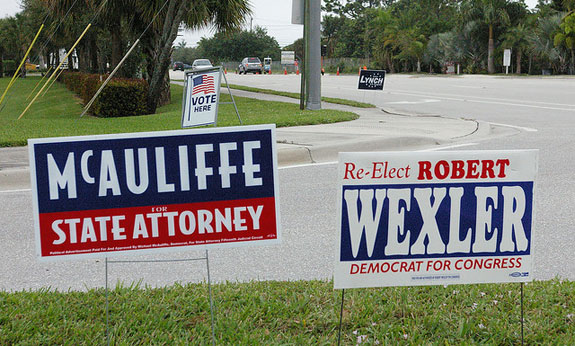
The new elections law makes it tougher for organizations to register voters and for people to vote. (Photo by Rick Neuhoff.)
By Ralph De La Cruz
Florida Center for Investigative Reporting
I was hoping that, with the closing of the 2011 legislative session, I might be able to stop writing as much about Gov. Rick Scott.
Was hoping that, using journalistic parlance, I might be able to put Slick Rick “to bed.”
But, like a bad burrito, he just keeps coming back up.
Yesterday, there he was, turning a bad bill into law.
HB 1355 overhauls election law, making it tougher for organizations to register voters and for people to vote. Fewer days of early voting, voters won’t be allowed to update their legal address when they go to the polls, and in fact, people who have moved from one county to another will have to resort to filing a provisional ballot.
Orange County Supervisor of Elections Bill Cowles told the St. Petersburg Times that about 8,000 county voters updated their addresses on Election Day in 2008. And of those, about 3,000 had moved to Orange from another county. All those folks would have to file provisional ballots.
That scenario will likely play out in Florida’s other multi-county urban areas, such as South Florida and Tampa Bay. Not to speak of college towns likes Gainesville.
“The average voter is not paying attention, and they will not pay attention until they’re hit with this on Election Day,” Cowles said. “Especially if they are one of the voters who moved from one county to the next.”
Not surprisingly, public opposition to the bill, according to Scott’s own office, ran more than 10-to-1. The governor’s office received 14,000 calls asking him to veto it. Only 1,300 favored the bill.
Among the groups fiercely fighting it: The League of Women Voters. You’ve probably heard of them. They’re the ones who do radical stuff like put on candidate debates and conduct voter registration drives. As a result of the bill that places onerous restrictions — and heavy fines if they slip up — on groups conducting such drives, the league will probably stop registering voters.
The Florida State Association of Supervisor of Elections expressed concerns about the bill to legislators. And U.S. Sen. Bill Nelson, a Democrat, has asked the Department of Justice to block the law.
So why would Slick Rick buck such strong public opposition and sign HB 1355 into law, particularly in a state that seems to always be struggling with low voter turnout?
The law is a supposed response to the Republican Party’s bogeyman of choice: election fraud.
But aside from some anecdotal cases, there isn’t much to back up those claims of voter fraud.
Sure, there was the infamous case of some ACORN workers in Homestead who falsely registered non-existent voters. And a case in Daytona Beach where a local candidate tried to obtain absentee ballots. But the numbers — dozens of ballots in Daytona Beach and 900 registrations in Homestead — were hardly large enough to be called “widespread.”
And most importantly, both attempts were discovered. In ACORN’s case, self-discovered — ACORN turned itself in.
The Florida Department of Law Enforcement’s own 2008 report on voter fraud (again, based mostly on anecdotal cases) indicates that the biggest problems involve absentee ballots. An area that, curiously, isn’t covered by this new law.
As Cowles told the Times: voter fraud fears are overstated. Florida has a highly accurate voter registration database which assigns every voter a unique number. And each voter then has to show a photo ID before obtaining a ballot.
Simply put, there is no evidence of widespread voter fraud. Don’t take my word for it, or Cowles’. Check out Justin Levitt’s extensively researched and meticulously cited report for the Brennan Center for Justice.
Levitt’s paper also offers a more likely reason why Scott signed HB1355, which was passed by the Republican super-majority in the legislature. Levitt quotes a 2007 Houston Chronicle interview with Royal Masset, the former political director for the Republican Party of Texas.
Among Republicans it is an “article of religious faith that voter fraud is causing us to lose elections,” Masset said. He doesn’t agree with that, but does believe that requiring photo IDs could cause enough of a dropoff in legitimate Democratic voting to add 3 percent to the Republican vote.
The election law is almost certain to be challenged in court. Just as Scott’s order mandating the drug testing of state workers will be. As well as some of the new anti-abortion measures.
I may never be able to put Scott to bed.
